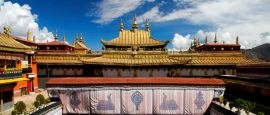Tibet: Doing business & staying in touch
Doing business in Tibet
Suits should be worn for business visits. Appointments should be made in advance and punctuality is expected. Business cards should be printed with a Chinese translation on the reverse and should be presented with both hands, while cards received should be studied and perhaps commented on. It is rude to put a business card directly into a pocket without giving it due attention, and a cardinal sin to put it in a back pocket. Business meals can last for several hours, and international visitors may well be expected to drink numerous toasts. A tolerance for tobacco smoke is an advantage.
Keeping in Touch in Tibet
Lhasa and several other cities have public telephone booths where you can make fairly cheap international phone calls (around £0.35 per minute to the UK). The cheapest way to make calls is through Skype, though not all Internet cafés are equipped with the software. Another way to call internationally is to buy a pre-paid calling card, available from most convenience stores in units of ¥20, 50, 100 and 200.
Tibet's mobile phone coverage is good and you can even make phone calls from Everest Base Camp! Roaming agreements exist with most major international mobile phone companies. Alternatively, you can buy a prepaid GSM SIM card (from China Mobile) that allows you to use your mobile like a local phone with a new number. You'll need your passport to register. Buy scratch cards to top up your balance.
Internet cafés can be found in most towns, and Wi-Fi is increasingly available at hotels and cafés in Lhasa. Access is cheap and usually reliable but you may need to present your passport to gain internet access. The state routinely blocks access to sites run by the exiled Tibetan government, human rights groups and some foreign news organisations such as the BBC. Postings by bloggers are closely monitored.
China and Tibet's media is tightly controlled by the national and provincial leadership. Access to foreign news providers is limited and re-broadcasting and the use of satellite receivers is restricted; shortwave radio broadcasts are jammed and websites are blocked. The only English language magazines or newspapers available in Lhasa are of the Chinese propaganda variety.








 You know where
You know where